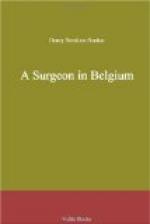But the climax of the entertainment, the bonne bouche of the afternoon, was reserved for the end of our drive, when we reached the wharf by the Arsenal, where the British stores and transport were collected. Here was a long row of motor-buses, about sixty of them, all drawn up in line along the river. Beside them was a long row of heavily loaded ammunition lorries, and on the other side of the road was the Arsenal, on our left, blazing away, with a vast column of smoke towering up to the sky. “It may blow up any minute,” said Colonel Farquharson cheerily, “I had better move that ammunition.” I have never seen an arsenal blow up, and I imagine it is a phenomenon requiring distance to get it into proper perspective; but I have some recollection of an arsenal blowing up in Antwerp a few years ago and taking a considerable part of the town with it. However, it was not our arsenal, so we waited and enjoyed the view till the ammunition had been moved, and the Colonel had done his best to get us the motor-buses. He could only get us four, so we had to make the best of a bad job. But. meanwhile the Germans had evidently determined to give us a really good show while they were about it, for while we waited a Taube came overhead and hovered for a moment, apparently uncertain as to whether a bomb or a shell would look better just there. A flash of tinsel falling in the sunlight showed us that she had made up her mind and was giving the range. But we could not stay, and were a quarter of a mile away when we looked back and saw the first shells falling close to where we had been two minutes before. They had come six miles.
The bombardment was increasing in violence, and large numbers of incendiary shells were being used, whilst in addition the houses set on fire during the night were now beginning to blaze. As we drove back we passed several houses in flames, and the passage of the narrow streets we traversed was by no means free from risk. At last we turned into our own street, the Boulevard Leopold, and there we met a sight which our eyes could scarcely credit. Three motor-buses stood before our door and patients were being crowded into them. Those buses and our own lives we owe to the kindness of Major Gordon. Without them some at least must have remained behind. The three were already well filled, for our friends thought that we had certainly been killed and that they must act for themselves. We sent them off under the escort of one of our cars, as it seemed foolish to keep them waiting in a position of danger. On our own four we packed all our remaining patients and all the hospital equipment we could remove. One does not waste time when one packs under shell fire, and at the end of three-quarters of an hour there was not a patient and very little of value in the hospital. I took charge of the theatre as I knew where the things went, and I think the British working man would have been rather astonished to see how fast the big sterilizers fell apart and the operating-tables




